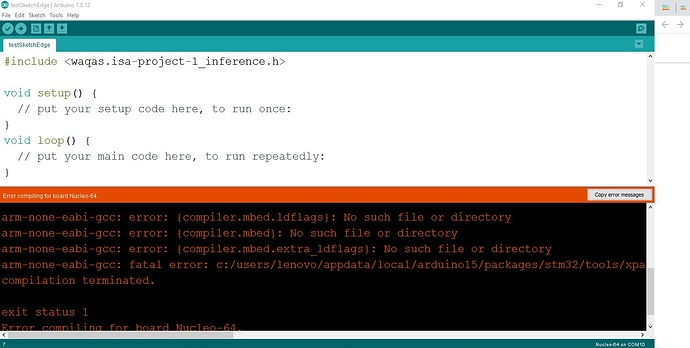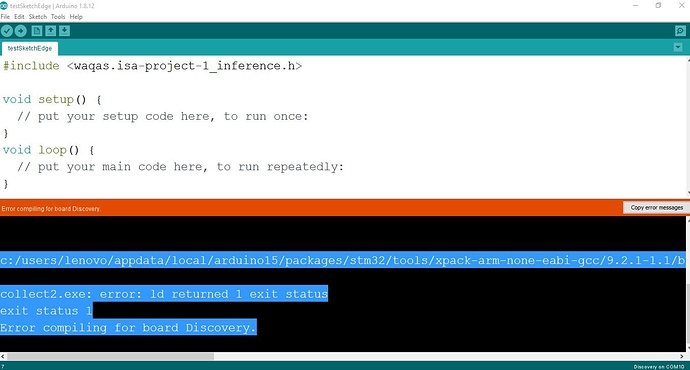Thank you @janjongboom! I’m eager to see if @aurel con help me :(.
In the other hand, i’m trying to find an example using STM32F401RE + IKS01A1 with Arduino IDE, to adquire data in real time and using a while loop to do the inference countinuosly, but I can’t find it :(.
I have this program in Arduino IDE using the Accelerometer of my module, and I would like to do implement Edge Impulse inference in a continuos while loop. I know I need to use several lectures but I don’t know how to proceed, and I’m stuck :(.
Can you help me? :(. This is the code, where I adquire de accelerometer data:
// Includes.
#include <LSM6DS0Sensor.h>
#if defined(ARDUINO_SAM_DUE)
#define DEV_I2C Wire1 //Define which I2C bus is used. Wire1 for the Arduino Due
#define SerialPort Serial
#else
#define DEV_I2C Wire //Or Wire
#define SerialPort Serial
#endif
// Components.
LSM6DS0Sensor *AccGyr;
void setup() {
// Led.
pinMode(13, OUTPUT);
// Initialize serial for output.
SerialPort.begin(9600);
// Initialize I2C bus.
DEV_I2C.begin();
// Initlialize components.
AccGyr = new LSM6DS0Sensor(&DEV_I2C);
AccGyr->Enable_X();
AccGyr->Enable_G();
}
void loop() {
// Led blinking.
digitalWrite(13, HIGH);
delay(250);
digitalWrite(13, LOW);
delay(250);
// Read accelerometer and gyroscope.
int32_t accelerometer[3];
int32_t gyroscope[3];
AccGyr->Get_X_Axes(accelerometer);
AccGyr->Get_G_Axes(gyroscope);
// Output data.
SerialPort.print("| Acc[mg]: ");
SerialPort.print(accelerometer[0]);
SerialPort.print(" ");
SerialPort.print(accelerometer[1]);
SerialPort.print(" ");
SerialPort.print(accelerometer[2]);
SerialPort.print(" | Gyr[mdps]: ");
SerialPort.print(gyroscope[0]);
SerialPort.print(" ");
SerialPort.print(gyroscope[1]);
SerialPort.print(" ");
SerialPort.print(gyroscope[2]);
SerialPort.println(" |");
}
What I need to modify @janjongboom? Can you help me? I’m stuck with this 
Thank you for your help!! 
EDIT: I have done this program (I don’t know If I did it well), but I’m getting errors related to Edge Impulse Library when compiling 
/* Includes ---------------------------------------------------------------- */
#include <juacuegut-project-1_inference.h>
// Includes.
#include <LSM6DS0Sensor.h>
#if defined(ARDUINO_SAM_DUE)
#define DEV_I2C Wire1 //Define which I2C bus is used. Wire1 for the Arduino Due
#define SerialPort Serial
#else
#define DEV_I2C Wire //Or Wire
#define SerialPort Serial
#endif
/* Constant defines -------------------------------------------------------- */
#define CONVERT_G_TO_MS2 9.80665f
/* Private variables ------------------------------------------------------- */
static bool debug_nn = false; // Set this to true to see e.g. features generated from the raw signal
// Components.
LSM6DS0Sensor *AccGyr;
/**
* @brief Arduino setup function
*/
void setup()
{
// put your setup code here, to run once:
Serial.begin(115200);
Serial.println("Edge Impulse Inferencing Demo");
if (EI_CLASSIFIER_RAW_SAMPLES_PER_FRAME != 3) {
ei_printf("ERR: EI_CLASSIFIER_RAW_SAMPLES_PER_FRAME should be equal to 3 (the 3 sensor axes)\n");
return;
}
// Led.
pinMode(13, OUTPUT);
// Initialize I2C bus.
DEV_I2C.begin();
// Initlialize components.
AccGyr = new LSM6DS0Sensor(&DEV_I2C);
AccGyr->Enable_X();
AccGyr->Enable_G();
}
/**
* @brief Printf function uses vsnprintf and output using Arduino Serial
*
* @param[in] format Variable argument list
*/
void ei_printf(const char *format, ...) {
static char print_buf[1024] = { 0 };
va_list args;
va_start(args, format);
int r = vsnprintf(print_buf, sizeof(print_buf), format, args);
va_end(args);
if (r > 0) {
Serial.write(print_buf);
}
}
/**
* @brief Get data and run inferencing
*
* @param[in] debug Get debug info if true
*/
void loop()
{
ei_printf("\nStarting inferencing in 2 seconds...\n");
delay(2000);
// Led blinking.
digitalWrite(13, HIGH);
delay(250);
digitalWrite(13, LOW);
delay(250);
// Read accelerometer and gyroscope.
int32_t accelerometer[3];
int32_t gyroscope[3];
AccGyr->Get_X_Axes(accelerometer);
AccGyr->Get_G_Axes(gyroscope);
ei_printf("Sampling...\n");
// Allocate a buffer here for the values we'll read from the IMU
float buffer[EI_CLASSIFIER_DSP_INPUT_FRAME_SIZE] = { 0 };
for (size_t ix = 0; ix < EI_CLASSIFIER_DSP_INPUT_FRAME_SIZE; ix += 3) {
// Determine the next tick (and then sleep later)
uint64_t next_tick = micros() + (EI_CLASSIFIER_INTERVAL_MS * 1000);
//IMU.readAcceleration(buffer[ix], buffer[ix + 1], buffer[ix + 2]);
buffer[ix + 0] = accelerometer[0];
buffer[ix + 1] = accelerometer[1];
buffer[ix + 2] = accelerometer[2];
buffer[ix + 0] *= CONVERT_G_TO_MS2;
buffer[ix + 1] *= CONVERT_G_TO_MS2;
buffer[ix + 2] *= CONVERT_G_TO_MS2;
delayMicroseconds(next_tick - micros());
}
// Turn the raw buffer in a signal which we can the classify
signal_t signal;
int err = numpy::signal_from_buffer(buffer, EI_CLASSIFIER_DSP_INPUT_FRAME_SIZE, &signal);
if (err != 0) {
ei_printf("Failed to create signal from buffer (%d)\n", err);
return;
}
// Run the classifier
ei_impulse_result_t result = { 0 };
err = run_classifier(&signal, &result, debug_nn);
if (err != EI_IMPULSE_OK) {
ei_printf("ERR: Failed to run classifier (%d)\n", err);
return;
}
// print the predictions
ei_printf("Predictions (DSP: %d ms., Classification: %d ms., Anomaly: %d ms.): \n",
result.timing.dsp, result.timing.classification, result.timing.anomaly);
for (size_t ix = 0; ix < EI_CLASSIFIER_LABEL_COUNT; ix++) {
ei_printf(" %s: %.5f\n", result.classification[ix].label, result.classification[ix].value);
}
#if EI_CLASSIFIER_HAS_ANOMALY == 1
ei_printf(" anomaly score: %.3f\n", result.anomaly);
#endif
}
#if !defined(EI_CLASSIFIER_SENSOR) || EI_CLASSIFIER_SENSOR != EI_CLASSIFIER_SENSOR_ACCELEROMETER
#error "Invalid model for current sensor"
#endif
Errors compiling:
c:/arduino/portable/packages/stm32/tools/xpack-arm-none-eabi-gcc/9.2.1-1.1/bin/../lib/gcc/arm-none-eabi/9.2.1/../../../../arm-none-eabi/bin/ld.exe: sketch\nano_ble33_sense_accelerometer_MODIFIED.ino.cpp.o: in function `ei::numpy::scale(ei::ei_matrix*, float) [clone .part.0]':
nano_ble33_sense_accelerometer_MODIFIED.ino.cpp:(.text._ZN2ei5numpy5scaleEPNS_9ei_matrixEf.part.0+0x30): undefined reference to `arm_mat_scale_f32'
c:/arduino/portable/packages/stm32/tools/xpack-arm-none-eabi-gcc/9.2.1-1.1/bin/../lib/gcc/arm-none-eabi/9.2.1/../../../../arm-none-eabi/bin/ld.exe: sketch\nano_ble33_sense_accelerometer_MODIFIED.ino.cpp.o: in function `ei::numpy::transpose(ei::ei_matrix*)':
nano_ble33_sense_accelerometer_MODIFIED.ino.cpp:(.text._ZN2ei5numpy9transposeEPNS_9ei_matrixE[_ZN2ei5numpy9transposeEPNS_9ei_matrixE]+0x62): undefined reference to `arm_mat_trans_f32'
c:/arduino/portable/packages/stm32/tools/xpack-arm-none-eabi-gcc/9.2.1-1.1/bin/../lib/gcc/arm-none-eabi/9.2.1/../../../../arm-none-eabi/bin/ld.exe: sketch\nano_ble33_sense_accelerometer_MODIFIED.ino.cpp.o: in function `ei::numpy::mean(ei::ei_matrix*, ei::ei_matrix*)':
nano_ble33_sense_accelerometer_MODIFIED.ino.cpp:(.text._ZN2ei5numpy4meanEPNS_9ei_matrixES2_[_ZN2ei5numpy4meanEPNS_9ei_matrixES2_]+0x56): undefined reference to `arm_mean_f32'
c:/arduino/portable/packages/stm32/tools/xpack-arm-none-eabi-gcc/9.2.1-1.1/bin/../lib/gcc/arm-none-eabi/9.2.1/../../../../arm-none-eabi/bin/ld.exe: sketch\nano_ble33_sense_accelerometer_MODIFIED.ino.cpp.o: in function `ei::numpy::rfft(float const*, unsigned int, ei::fft_complex_t*, unsigned int, unsigned int)':
nano_ble33_sense_accelerometer_MODIFIED.ino.cpp:(.text._ZN2ei5numpy4rfftEPKfjPNS_13fft_complex_tEjj[_ZN2ei5numpy4rfftEPKfjPNS_13fft_complex_tEjj]+0xfc): undefined reference to `arm_rfft_fast_init_f32'
c:/arduino/portable/packages/stm32/tools/xpack-arm-none-eabi-gcc/9.2.1-1.1/bin/../lib/gcc/arm-none-eabi/9.2.1/../../../../arm-none-eabi/bin/ld.exe: nano_ble33_sense_accelerometer_MODIFIED.ino.cpp:(.text._ZN2ei5numpy4rfftEPKfjPNS_13fft_complex_tEjj[_ZN2ei5numpy4rfftEPKfjPNS_13fft_complex_tEjj]+0x130): undefined reference to `arm_rfft_fast_f32'
c:/arduino/portable/packages/stm32/tools/xpack-arm-none-eabi-gcc/9.2.1-1.1/bin/../lib/gcc/arm-none-eabi/9.2.1/../../../../arm-none-eabi/bin/ld.exe: sketch\nano_ble33_sense_accelerometer_MODIFIED.ino.cpp.o: in function `ei::numpy::rfft(float const*, unsigned int, float*, unsigned int, unsigned int)':
nano_ble33_sense_accelerometer_MODIFIED.ino.cpp:(.text._ZN2ei5numpy4rfftEPKfjPfjj[_ZN2ei5numpy4rfftEPKfjPfjj]+0xc8): undefined reference to `arm_rfft_fast_init_f32'
c:/arduino/portable/packages/stm32/tools/xpack-arm-none-eabi-gcc/9.2.1-1.1/bin/../lib/gcc/arm-none-eabi/9.2.1/../../../../arm-none-eabi/bin/ld.exe: nano_ble33_sense_accelerometer_MODIFIED.ino.cpp:(.text._ZN2ei5numpy4rfftEPKfjPfjj[_ZN2ei5numpy4rfftEPKfjPfjj]+0xfc): undefined reference to `arm_rfft_fast_f32'
c:/arduino/portable/packages/stm32/tools/xpack-arm-none-eabi-gcc/9.2.1-1.1/bin/../lib/gcc/arm-none-eabi/9.2.1/../../../../arm-none-eabi/bin/ld.exe: nano_ble33_sense_accelerometer_MODIFIED.ino.cpp:(.text._ZN2ei5numpy4rfftEPKfjPfjj[_ZN2ei5numpy4rfftEPKfjPfjj]+0x128): undefined reference to `arm_rms_f32'
c:/arduino/portable/packages/stm32/tools/xpack-arm-none-eabi-gcc/9.2.1-1.1/bin/../lib/gcc/arm-none-eabi/9.2.1/../../../../arm-none-eabi/bin/ld.exe: sketch\nano_ble33_sense_accelerometer_MODIFIED.ino.cpp.o: in function `ei::spectral::feature::spectral_analysis(ei::ei_matrix*, ei::ei_matrix*, float, ei::spectral::filter_t, float, unsigned char, unsigned short, unsigned char, float, ei::ei_matrix*)':
nano_ble33_sense_accelerometer_MODIFIED.ino.cpp:(.text._ZN2ei8spectral7feature17spectral_analysisEPNS_9ei_matrixES3_fNS0_8filter_tEfhthfS3_[_ZN2ei8spectral7feature17spectral_analysisEPNS_9ei_matrixES3_fNS0_8filter_tEfhthfS3_]+0x76e): undefined reference to `arm_rms_f32'
collect2.exe: error: ld returned 1 exit status
exit status 1
Error compilando para la tarjeta Nucleo-64.





